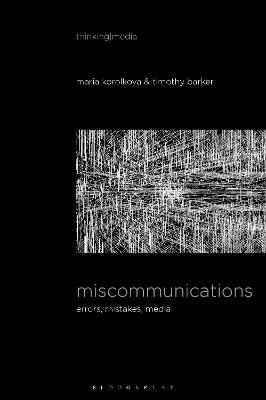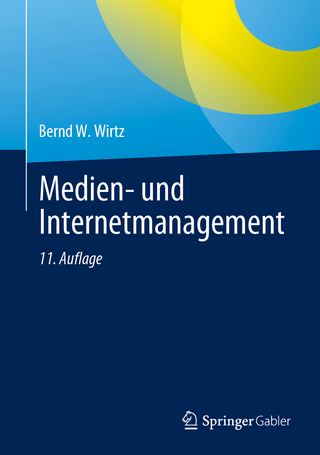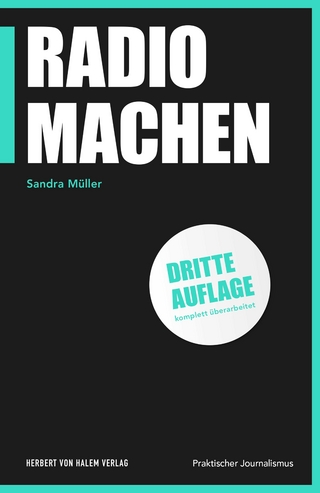
Miscommunications
Bloomsbury Academic USA (Verlag)
978-1-5013-6385-6 (ISBN)
To address these questions, this collection assembles a range of cutting-edge philosophical, socio-political, art historical and media theoretical inquiries that address contemporary culture as a terrain of miscommunication. If the period since the industrial revolution can be thought of as marked by the realisation of the possibilities for global communication, in terms of the telephone, telegraph, television, and finally the internet, Miscommunications shows that to think about the contemporary historical moment, a new history and theory of these devices needs to be written, one which illustrates the emergence of the current cultures of miscommunication and the powers of the false.
The essays in the book chart the new conditions for discourse in the 21st century and collectively show how studies of communication can be refigured when we focus on the capacity for errors, accidents, mistakes, malfunctions and both intentional and non-intentional miscommunications.
Maria Korolkova is a senior lecturer in media and film studies and academic portfolio lead in media at the University of Greenwich, UK, specialising in visual culture, intermediality, film, architecture, cultural theory, and Russian culture. In her research, Maria explores themes of miscommunication and chaos, global media, visual and sonic cultures, as well as the relationship between film and architecture. Maria has curated public events in internationally renowned institutions such as The Barbican, Courtauld Institute of Arts, Regents Street Cinema, London, Centre Pompidou, Paris, and others. Timothy Barker is a senior lecturer in digital media and the head of Film and Television Studies at the University of Glasgow, UK. He is the author of two books, Time and the Digital (2012) and Against Transmission (Bloomsbury, 2017), both of which outline a media philosophical approach for addressing questions of time and mediation in the contemporary world. His broad research interests include digital media theory, philosophies of technology, game studies and process philosophy.
INTRODUCTION: Bad Operators
Timothy Barker, University of Glasgow, UK, and Maria Korolkova, University of Greenwich, UK
PART 1: MIS-THEORIES
Chapter 1: Affirmative Imperfection Rhetoric and Aesthetics: A Genealogy
Ellen Rutten, University of Amsterdam, the Netherlands
Chapter 2: Post Communication Theory: The Non-Dialogical
Timothy Barker, University of Glasgow, UK
Chapter 3: Miscommunication and Democratic Membership
Reidar Due, University of Oxford, UK
Chapter 4: There is No ‘Error’ in Techo-logics: A Radically Media-Archaeological Approach
Wolfgang Ernst, Humboldt University, Berlin, Germany
PART 2: MIS-SOUNDS
Chapter 5: Quiet in the Forest
Frances Dyson, University of California, USA
Chapter 6: The Guardians of the Possible
Stephen Kennedy, University of Greenwich, UK
Chapter 7: Communicating the Incommunicable: Formalism and Noise in Michel Serres
Thomas Sutherland, University of Lincoln, UK
PART 3: MIS-MATTERS
Chapter 8: Objects Mis-taken: Towards the Aesthetics of Displaced Materiality
Maria Korolkova, University of Greenwich, UK
Chapter 9: Fai(lure): Encounter with the Unstable Medium in the Work of Art
Maryam Muliaee and Mani Mehrvarz, University at Buffalo, USA
Chapter 10: A Relational Materialist Approach to Errant Media Systems: The Case of Internet Video Producers
John Hondros, City, University of London, UK
Chapter 11: Negotiating Two Models of Truth: Satire, Miscommunication and Critique in Elle (2016)
Alex Lichtenfels, University of Salford, UK
PART 4: MIS-HAPPENINGS
Chapter 12: Disastrous Communication: Walter Benjamin’s ‘The Railway Disaster at the Firth of Tay’
Dominic Smith, University of Dundee, UK
Chapter 13: Accidental Recordings: Unintentional Media Aesthetics
Ella Klik, The Polonsky Academy, Israel
Chapter 14: Desert Media. Glitches, Breakdowns, and Media Arrhythmia in the Sahara
Andrea Mariani, University of Udine, Italy
PART 5: MIS-FUNCTIONS
Chapter 15: The Error at the End of the Internet
Peter Krapp, University of California, Irvine, USA
Chapter 16: From Bugs to Features: An Archaeology of Errors and/in/as Computer Games
Stefan Höltgen, Humboldt University, Berlin, Germany
Chapter 17: We Interrupt This Programme: On the Cultural Techniques of ‘Technical Difficulties’
Jörgen Rahm-Skågeby, Stockholm University, Sweden
Chapter 18: Glitches as Fictional (Mis)Communication
Nele Van de Mosselaer, University of Antwerp, Belgium, and Nathan Wildman, Tilburg University, the Netherlands
Index
| Erscheinungsdatum | 15.01.2021 |
|---|---|
| Reihe/Serie | Thinking Media |
| Zusatzinfo | 10 bw illus |
| Verlagsort | New York |
| Sprache | englisch |
| Maße | 140 x 216 mm |
| Gewicht | 544 g |
| Themenwelt | Sozialwissenschaften ► Kommunikation / Medien ► Journalistik |
| Sozialwissenschaften ► Kommunikation / Medien ► Kommunikationswissenschaft | |
| Sozialwissenschaften ► Kommunikation / Medien ► Medienwissenschaft | |
| Wirtschaft | |
| ISBN-10 | 1-5013-6385-9 / 1501363859 |
| ISBN-13 | 978-1-5013-6385-6 / 9781501363856 |
| Zustand | Neuware |
| Haben Sie eine Frage zum Produkt? |
aus dem Bereich


